Summer 2015-6
Casper Jean Rimbaud
The World Seen Darkly
Novelist, poet, songwriter, visual artist and filmmaker Casper Jean Rimbaud was born in Bradford England to Maltese and Irish Parents, and immigrated to Melbourne Victoria at the age of three.
Growing up with a severely mentally ill mother, and an often absent father due to work commitments, Casper found solace in art, devouring music and film which instilled in him a great knowledge of his art forms for the years to come. He had a troubled childhood which resulted in time in foster care and a stint of being involved in petty crimes in his teens. He was eventually diagnosed with Bipolar disorder and hospitalized in the Larundel mental hospital after a near successful suicide attempt. All his adult life so far he has battled with bipolar disorder, and subsequently the demons that walk holding its hand, such as drug addiction.
His debut novel Post Encounter, and debut film Dark Night of the Werewolf, were both created during bipolar episodes. Casper has always been extremely honest about his struggles with bipolar and drug addiction, and has been turned to for guidance by others suffering from the illness. I sat down with Casper to discuss his novel and film, and his struggle with mental illness.
Have you ever felt held back because of your illness?
I suppose so, but only in the public sector. I spent years as a psychiatric inpatient, and after that was thrown into low-level housing for the recovering mentally ill. Trying to navigate society after 15 years living outside of it wasn't easy. It still isn't. I felt held back in the workforce as it was utterly alien to me. Friendship was utterly alien. I lived alone for 5 years and literally spoke to no-one.
What was the one thing you learnt about yourself whilst writing your debut novel Post Encounter?
That bipolar disorder, psychosis and addiction always find their way into my work. The evils suffered by the Patterson family in the novel are the same types of evil I lived every day. I read that book back and realized I was writing about myself - again.
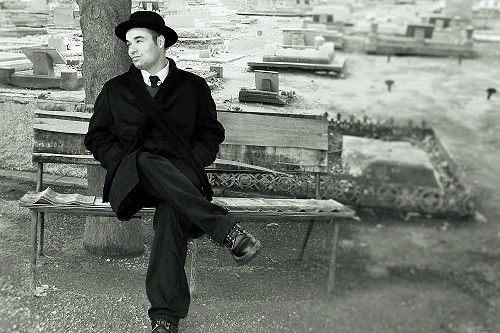
What is the most difficult part of your illness for you?
Again, finding my place in society, people tend not to like you when you swing from one extreme to the next. I worked for five years, trying to keep a lid on it but it didn't work. I found it impossible to care about things like relationships, and working a job because I'd been raised apart from all of that. My teenage years were spent in a hospital. People deemed me arrogant, but it was like being an alien. Literally, it still is.
What was your overall goal in writing Post Encounter?
I didn't have one to begin with. I just liked the idea of the story. It reminded me of Harold Pinter's The Birthday Party. I love that play and I love that film, so there was the seed of it. Really I just wanted to show what would happen if an ordinary family were confronted by something that invalidated their existence as they knew it.
Have you ever had a close encounter?
I filmed a UFO sighting last year. Up until then I didn't really believe in that kind of thing. I suppose I still don't. I filmed irregular lights in the sky that were genuinely weird, but hardly smoking gun evidence. I don't believe in insect-like humanoids kidnapping people if that's what you mean. I find the fantasy of it intriguing though.
You are considered a multimedia artist. Do you think that your bipolar is a blessing or a curse in regards to art?
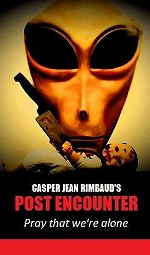
You win some and you lose some. When I started the novel I did so descending into a serious bipolar episode. My entire life eroded as I wrote Post Encounter. I came up with great stuff, but it was an expensive journey. I regret nothing though. I was working a demeaning job, living a life I found hard to come to grips with. Bipolar freed me. It was a great time, perhaps one of the most interesting of my life, but the only benefit was artistic. My life was a mess man.
You have a broad range of artistic talents, what is your favourite form of art, and which one do you think that you are best at? And which one you struggle with the most?
I love writing songs, but I'm a bedroom folk DIY guy. Music is the hardest art form and I never really got good at it. I used music as another form of poetry, singing into tape recorders and trying to mold something original. I love filmmaking as it incorporates multiple elements of art; writing, photography and music. It's not for me to say what I excel at. I struggle just finding satisfaction in what I do sometimes.
How has your illness factored into reaching your goals? do you think it has helped you be more creative or has it held you back emotionally?
It got me fired from a job that held me back. It destroyed a relationship that held me back. So I suppose in that sense, it helped. It directed the burning of bridges that lead to the freedom I now have, and the opportunities I have been given. Like I said, I regret nothing. The worst period in my adult life of mental illness was only a few years ago and though my memories are patchy my regrets are few. I used to get home from work and start what I deemed my 'real work' immediately. It was my brother and I, running around the suburbs of Brunswick with video cameras at three in the morning making a movie. I was a cowboy then. I didn't care what happened, and I suppose that freedom paid off in the end.
Is there a message in your novel that you want your readers to grasp?
That we're merely cogs in a machine. We know nothing. We go to work like drones and worker bees with little uniforms on, never questioning what is really going on. I don't mean conspiracy theory type stuff, I mean reality itself. What is reality? What is my place in it? The Patterson's are FORCED to contemplate these questions. I want everyone else to as well.
A lot of writers say that their books are the toil of their blood, sweat and tears, do you relate to this idea? How much of you is in Post Encounter, especially the characters?
I AM the Patterson family, each of them. Samuel California and Mr G, they are something else entirely.
You are about to release a film called Dark Night of the Werewolf, which is about mental illness, is this from your own experiences?
I've always been fascinated by the werewolf as it's familiar to me, especially the Sidomakian werewolf, the otherwise decent guy who transforms into a monster. Dark Night of the Werewolf though is more grounded in 'real world' cases of lycanthropy from the 14th and 15th century. When I conceived that film, I was in the grip of a nasty substance abuse problem, in short I was insane. My brother was living with me and I'd be walking around the house half-naked in a translucent mask rambling about the nature of reality. He just filmed me. It's not so much that I interpolated mental illness into the film, but we captured mental illness in real time. I was literally insane then, and people around me were scared. Anything dark you can imagine, bipolar, suicide, even Satanism was happening. It was crazy and I was dangerous. All I wanted with that film was to show a man utterly consumed by rage and pain. I succeeded.
Casper Jean Rimbaud's debut novel Post Encounter is due for release before Christmas 2015, by American Independent publishing house Fiction Terrifica. His debut film will be out in the New Year. Casper is also the founder of an enterprise titled Melbournian Psycho, which is a medium to show off his multi-media talents and also offer exposure to fellow Melbournian artists. To learn more you can visit www.melbournianpsycho.net, Post Encounter will be available on Amazon and other good book stores.

Destiny West is an award winning published author in both Erotica and Horror genres. She is also the Co-host of a Australian horror podcast called Ozploitation.
Destiny also works as a journalist for a newspaper, and is currently working on her first feature length horror film. You can find her at www.destinywest.com.au
For posts about Melbourne events, places, news, reviews, giveaways, see our Facebook Page:

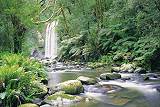
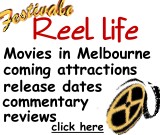

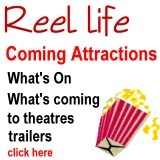
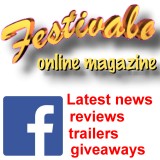

 Published in Melbourne, Victoria, Australia
Published in Melbourne, Victoria, Australia